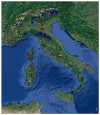Effects of Plant-Emitted Monoterpenes on Anxiety Symptoms: A Propensity-Matched Observational Cohort Study
- PMID: 36833470
- PMCID: PMC9957398
- DOI: 10.3390/ijerph20042773
Effects of Plant-Emitted Monoterpenes on Anxiety Symptoms: A Propensity-Matched Observational Cohort Study
Abstract
Immersive experiences in green areas, particularly in forests, have long been known to produce beneficial effects for human health. However, the exact determinants and mechanisms leading to healthy outcomes remain to be elucidated. The purpose of this observational cohort study was to investigate whether inhaling plant-emitted biogenic volatile compounds, namely monoterpenes (MTs), can produce specific effects on anxiety symptoms. Data from 505 subjects participating in 39 structured forest therapy sessions at different Italian sites were collected. The air concentration of monoterpenes was measured at each site. STAI state questionnaires were administered before and after the sessions as a measure of anxiety. A propensity score matching analysis was then performed, considering an above-average exposure to inhalable air MTs as the treatment. The estimated effect was -1.28 STAI-S points (95% C.I. -2.51 to -0.06, p = 0.04), indicating that the average effect of exposure to high MT air concentrations during forest therapy sessions was to decrease anxiety symptoms.
Keywords: anxiety; biogenic volatile organic compounds; forest therapy; monoterpenes; propensity matching; α-pinene.
Conflict of interest statement
The authors declare no conflict of interest.
Figures







Similar articles
-
Plant specific emission pattern of biogenic volatile organic compounds (BVOCs) from common plant species of Central India.Environ Monit Assess. 2018 Oct 3;190(11):631. doi: 10.1007/s10661-018-7015-6. Environ Monit Assess. 2018. PMID: 30284054
-
Evident elevation of atmospheric monoterpenes due to degradation-induced species changes in a semi-arid grassland.Sci Total Environ. 2016 Jan 15;541:1499-1503. doi: 10.1016/j.scitotenv.2015.10.022. Epub 2015 Nov 11. Sci Total Environ. 2016. PMID: 26490529
-
Biogenic volatile organic compounds (BVOCs) emissions from Abies alba in a French forest.Sci Total Environ. 2006 Feb 1;354(2-3):232-45. doi: 10.1016/j.scitotenv.2005.01.044. Epub 2005 Sep 2. Sci Total Environ. 2006. PMID: 16140360
-
[Effects of Elevated Ozone on Biogenic Volatile Organic Compounds (BVOCs) Emission: A Review].Huan Jing Ke Xue. 2018 Nov 8;39(11):5257-5265. doi: 10.13227/j.hjkx.201802075. Huan Jing Ke Xue. 2018. PMID: 30628251 Review. Chinese.
-
Forest Volatile Organic Compounds and Their Effects on Human Health: A State-of-the-Art Review.Int J Environ Res Public Health. 2020 Sep 7;17(18):6506. doi: 10.3390/ijerph17186506. Int J Environ Res Public Health. 2020. PMID: 32906736 Free PMC article. Review.
Cited by
-
Demographic, Psychosocial, and Lifestyle-Related Characteristics of Forest Therapy Participants in Italy: A Multicenter Cross-Sectional Survey.Healthcare (Basel). 2023 Jun 2;11(11):1627. doi: 10.3390/healthcare11111627. Healthcare (Basel). 2023. PMID: 37297767 Free PMC article.
-
Assessing the Anxiolytic and Relaxation Effects of Cinnamomum camphora Essential Oil in University Students: A Comparative Study of EEG, Physiological Measures, and Psychological Responses.Front Psychol. 2024 Jul 26;15:1423870. doi: 10.3389/fpsyg.2024.1423870. eCollection 2024. Front Psychol. 2024. PMID: 39131857 Free PMC article.
-
From biodiversity to nature deficiency in human health and disease.Porto Biomed J. 2024 Jan 12;9(1):245. doi: 10.1097/j.pbj.0000000000000245. eCollection 2024 Jan-Feb. Porto Biomed J. 2024. PMID: 38344457 Free PMC article. Review.
References
-
- Corazon S.S., Sidenius U., Poulsen D.V., Gramkow M.C., Stigsdotter U.K. Psycho-Physiological Stress Recovery in Outdoor Nature-Based Interventions: A Systematic Review of the Past Eight Years of Research. Int. J. Environ. Res. Public Health. 2019;16:1711. doi: 10.3390/ijerph16101711. - DOI - PMC - PubMed
-
- Yeon P.-S., Jeon J.-Y., Jung M.-S., Min G.-M., Kim G.-Y., Han K.-M., Shin M.-J., Jo S.-H., Kim J.-G., Shin W.-S. Effect of Forest Therapy on Depression and Anxiety: A Systematic Review and Meta-Analysis. Int. J. Environ. Res. Public Health. 2021;18:12685. doi: 10.3390/ijerph182312685. - DOI - PMC - PubMed
Publication types
MeSH terms
Substances
LinkOut - more resources
Full Text Sources

